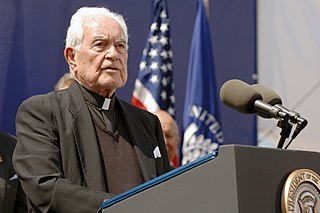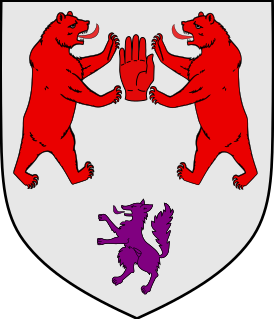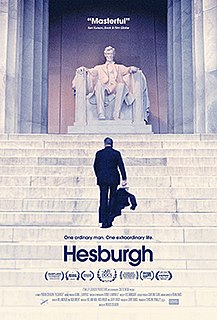
The University of Notre Dame du Lac, known simply as Notre Dame or ND, is a private Catholic research university in Notre Dame, Indiana, outside the city of South Bend. French priest Edward Sorin founded the school in 1842. The main campus covers 1,261 acres in a suburban setting and contains landmarks such as the Golden Dome, the Word of Life mural, Notre Dame Stadium, and the Basilica.

Theodore Martin Hesburgh, CSC was a native of Syracuse, New York, who became an ordained priest of the Congregation of Holy Cross and is best known for his service as the president of the University of Notre Dame for thirty-five years (1952–1987). In addition to his career as an educator and author, Hesburgh was a public servant and social activist involved in numerous American civic and governmental initiatives, commissions, international humanitarian projects, and papal assignments. Hesburgh received numerous honors and awards for his service, most notably the United States's Presidential Medal of Freedom (1964) and Congressional Gold Medal (2000). As of 2013, he also held the world's record for the individual with most honorary degrees with more than 150.
The sanctions against Iraq were a comprehensive financial and trade embargo imposed by the United Nations Security Council (UNSC) on Iraq. They began August 6, 1990, four days after Iraq's invasion of Kuwait, stayed largely in force until May 22, 2003, and persisted in part, including reparations to Kuwait. The original stated purposes of the sanctions were to compel Iraq to withdraw from Kuwait, to pay reparations, and to disclose and eliminate any weapons of mass destruction. In December 2021, Iraq's central bank announced that it had paid off its entire debt of $52 billion in war reparations to Kuwait.

Abbas Malekzadeh Milani is an Iranian-American historian and author. Milani is a visiting professor of Political Science and the director of the Iranian Studies program at Stanford University. He is also a research fellow and co-director of the Iran Democracy Project at Stanford University's Hoover Institution. Milani has found evidence that Persian modernism dates back to more than 1,000 years ago.
The Rev. John J. Cavanaugh, C.S.C., an American Roman Catholic priest of the Congregation of Holy Cross, served from 1946 to 1952 as the 14th president of the University of Notre Dame, having previously served as its vice president since 1941.
Donald Kenneth Gutierrez was an American writer and professor emeritus of English literature.

The College of Arts and Letters is the oldest and largest college within the University of Notre Dame. The Dean of the College of Arts and Letters is Sarah Mustillo.
David Cortright is an American scholar and peace activist. He is Director of Policy Studies at the Kroc Institute for International Peace Studies at the University of Notre Dame and Chair of the Board of the Fourth Freedom Forum. Cortright has a long history of public advocacy for disarmament and the prevention of war.
Michael Stohl is Professor and a former Chair of the Department of Communication at the University of California, Santa Barbara. He researches organizational and political communication with special focus on terrorism, human rights and global relations. He has been a guest commentator on National Public Radio, NBC, and CBS for stories on terrorism and human rights. He has been critical of the George W. Bush administration's understanding of terrorism networks during the War on Terrorism.

Theodore Hesburgh Library is the primary building of the University of Notre Dame's library system. The present-day building opened on September 18, 1963, as Memorial Library. In 1987, it was renamed Hesburgh Library, in honor of Rev. Theodore Hesburgh, C.S.C., who served as the university's president from 1952 to 1987. The library's exterior façade that faces the university's football stadium includes a large, 134-foot (41 m) by 68-foot (21 m) mural called The Word of Life, or more commonly known as Touchdown Jesus. As of 2009, the library ranked as the 61st largest collection among research universities in the United States, with an estimated 3.39 million volumes.
Win Without War is a public education and advocacy coalition based in Washington, D.C. Founded in 2002 in the runup to the Iraq War, Win Without War remains active as a coalition of national, multi-issue organizations dedicated to advancing progressive national security solutions. The coalition comprises 37 national organizations including MoveOn.org, CREDO Action, the Council for a Livable World, and the NAACP. Win Without War is a program of the Center for International Policy.

The University of Notre Dame was founded on November 26, 1842, by Father Edward Sorin, CSC, who was also its first president, as an all-male institution on land donated by the Bishop of Vincennes. Today, many Holy Cross priests continue to work for the university, including as its president. Notre Dame rose to national prominence in the early 1900s for its Fighting Irish football team, especially under the guidance of the legendary coach Knute Rockne. Major improvements to the university occurred during the administration of Rev. Theodore Hesburgh between 1952 and 1987 as Hesburgh's administration greatly increased the university's resources, academic programs, and reputation and first enrolled women undergraduates in 1972.
International sanctions are political and economic decisions that are part of diplomatic efforts by countries, multilateral or regional organizations against states or organizations either to protect national security interests, or to protect international law, and defend against threats to international peace and security. These decisions principally include the temporary imposition on a target of economic, trade, diplomatic, cultural or other restrictions that are lifted when the motivating security concerns no longer apply, or when no new threats have arisen.
The Rev. John Hugh O'Donnell, C.S.C. was an American priest and President of the University of Notre Dame from 1940 to 1946, after having served has Vice President from 1934 to 1940.

Tantur Ecumenical Institute is an international ecumenical institute for advanced theological research in Jerusalem.

Flaherty Hall is one of the newest of the 32 Residence Halls on the campus of the University of Notre Dame and one of the 15 female dorms. It is located on Mod Quad, between Knott Hall and McCourtney Hall. Built in 2016 together with its twin dorm Dunne Hall, it was the first dorm built since Ryan Hall in 2009. The coat of arms is taken form the Flaherty family, with the bears replacing the Flaherty dragons.

Christ and the Samaritan Woman is an outdoor sculpture by Croatian sculptor Ivan Meštrović. Created in 1957, the sculpture resides in front of O’Shaughnessy Hall on the campus of the University of Notre Dame as part of the Shaheen-Mestrovic Memorial, which was completed in 1985 by the Department of Landscape Architecture and Planning in the South Bend office of Cole Associates. The marble and bronze sculpture depicts the events in John 4, in which Jesus converses and evangelizes to a woman from Samaria, with whom the Jews would not normally associate. Eli J. Shaheen, a Notre Dame alum, was the donor for the project, which is owned by the university. The “Woman at the Well,” as it is often referred, is flanked by sculptures of the gospel writers Luke the Evangelist and John the Evangelist.

Beatrice Fihn is a Swedish lawyer and, since 1 July 2014, executive director of the International Campaign to Abolish Nuclear Weapons (ICAN). On October 6, 2017, the Norwegian Nobel Committee announced that the 2017 Nobel Peace Prize honor was given to International Campaign to Abolish Nuclear Weapons (ICAN) "for its efforts to raise awareness of the catastrophic humanitarian consequences of nuclear weapons use and for pioneering efforts to achieve a treaty-based ban on nuclear weapons."

Hesburgh is a 2018 American documentary film directed by Patrick Creadon. The film follows the life of Fr. Theodore Hesburgh, President of the University of Notre Dame from 1952 through 1987, particularly during his time working on the U.S. Commission on Civil Rights. The film is drawn from archival footage, as well as interviews with family, colleagues at Notre Dame, politicians, journalists, and historians. Maurice LaMarche provides the voice of Hesburgh, narrating the documentary with words drawn from Hesburgh's writings and tapes.

Peter Wallensteen, born 29 July 1945 in Stockholm, is a peace and conflict researcher in Sweden, now Senior Professor in Peace and Conflict Research at Uppsala University. He was the first holder of the Dag Hammarskjöld Chair in Peace and Conflict Research at Uppsala University, 1985-2012. He was the Richard G. Starmann Sr. Research Professor of Peace Studies, at the Kroc Institute for International Peace Studies at University of Notre Dame, 2006-2018. From 1972 to 1999 he directed the Department of Peace and Conflict Research at Uppsala University.











